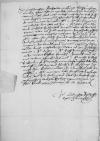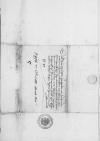List #5185
Ioannes DANTISCUS do Albrecht I von Hohenzollern-AnsbachCracow (Kraków), 1537-01-22
Rękopiśmienne podstawy źródłowe:
Pomocnicze podstawy źródłowe:
Publikacje:
| ||||||||||||
Tekst + aparat krytyczny + komentarzZwykły tekstTekst + komentarzTekst + aparat krytyczny
 GStA, PK, HBA, C 2, No 114, 2 unnumbered
GStA, PK, HBA, C 2, No 114, 2 unnumbered
Dem durchlauchten, hochgebornen furstenn(n) und herrn, herrn
 GStA, PK, HBA, C 2, No 114, 1 unnumbered
GStA, PK, HBA, C 2, No 114, 1 unnumbered
Durchlauchter, hochgeborner furst, hochgunstiger, lieber her(r). / Mein willige, freuntliche dienst zu voran(n). /
Ich hab nicht mocht noch lossen, / Ew(e)r F(urstlichen) D(urchlauch)t mit dissem meynem(m) schreib(e)n zu besuchen / und do mit meiner zu gedencken E(wer) D(urchlauch)t zu erinneren, nemlich in dem, das ich hie E(wer) D(urchlauch)t gern(n) fruntlich und nuczlich heth wold dinen(n), / wie ich dan ouch etwan, wor es stelle und zceit hot gehabt, / gethon(n), ouch was mir muglich noch gern thun wil. / Es sein aber hie solche hendel vorhanden(n), / die wunderlich zu ghen. / Muss mich derweg(en) ouch in gemeynen des
Dat(um)

